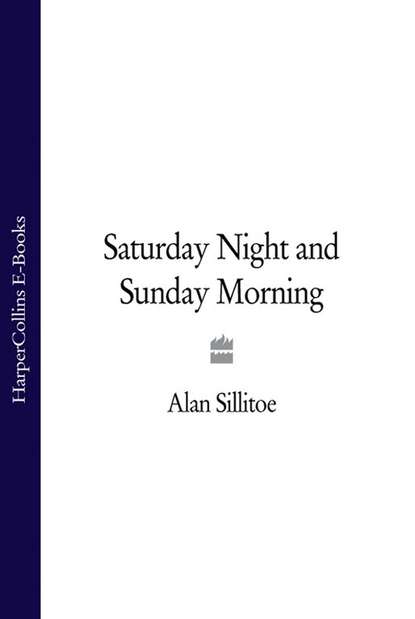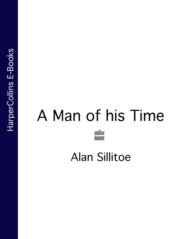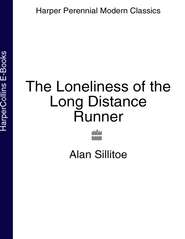По всем вопросам обращайтесь на: info@litportal.ru
(©) 2003-2025.
✖
Saturday Night and Sunday Morning
Настройки чтения
Размер шрифта
Высота строк
Поля
Saturday Night and Sunday Morning
Alan Sillitoe
This cult classic of working class life in post-war Nottingham follows the exploits of rebellious factory worker Arthur Seaton and is introduced by Richard Bradford.Working all day at a lathe leaves Arthur Seaton with energy to spare in the evenings. A hard-drinking, hard-fighting hooligan, he knows what he wants, and he's sharp enough to get it.Before long, his carryings-on with a couple of married women become the stuff of local gossip. But then one evening he meets a young girl and life begins to look less simple…First published in 1958, ‘Saturday Night and Sunday Morning’ achieved instant critical acclaim and helped to establish Alan Sillitoe as one of the greatest British writers of his generation. The film of the novel, starring Albert Finney, transformed British cinema and was much imitated.
ALAN SILLITOE
Saturday Night and
Sunday Morning
Table of Contents
Title Page (#uffd5dedb-2FFF-11e9-9e03-0cc47a520474)
Introduction to 1979 edition of Saturday Night and Sunday Morning (#uffd5dedb-4FFF-11e9-9e03-0cc47a520474)
Part One - Saturday Night (#uffd5dedb-5FFF-11e9-9e03-0cc47a520474)
1 (#uffd5dedb-6FFF-11e9-9e03-0cc47a520474)
2 (#uffd5dedb-7FFF-11e9-9e03-0cc47a520474)
3 (#uffd5dedb-8FFF-11e9-9e03-0cc47a520474)
4 (#litres_trial_promo)
5 (#litres_trial_promo)
6 (#litres_trial_promo)
7 (#litres_trial_promo)
8 (#litres_trial_promo)
9 (#litres_trial_promo)
10 (#litres_trial_promo)
11 (#litres_trial_promo)
12 (#litres_trial_promo)
Part Two - Sunday Morning (#litres_trial_promo)
13 (#litres_trial_promo)
14 (#litres_trial_promo)
15 (#litres_trial_promo)
16 (#litres_trial_promo)
Keep Reading (#litres_trial_promo)
P.S. (#litres_trial_promo)
About the author (#litres_trial_promo)
A Biographical Sketch (#)
Everyone Getting Blindo (#)
Top Ten Favourite Books (#)
About the book (#litres_trial_promo)
What the Papers Said (#)
Read on (#litres_trial_promo)
Must Reads (#)
Find Out More (#)
If You Loved This, You Might Like … (#)
On the Man, His Life and Art (#)
Also by the Author (#litres_trial_promo)
Copyright (#litres_trial_promo)
About the Publisher (#litres_trial_promo)
Introduction to 1979 edition of Saturday Night and Sunday Morning (#uffd5dedb-3FFF-11e9-9e03-0cc47a520474)
Saturday Night and Sunday Morning was first published nearly twenty years ago, in the autumn of 1958.
No one was more surprised by its success than I was, not even the reviewers and critics. I wrote the final version in Majorca, in 1956-7, but many of the chapters and various parts of it had been composed from 1950 onwards, so that it was in progress for seven years before the final typed version was sent to London.
Some of the chapters were originally written as short stories, a few of which were sent to magazines, but not accepted. One or two items in the novel (including the reflections while fishing by the canal bank on Sunday morning) were written as poems. They were merely incidents, yet fitted well into the novel because they either concerned one character — Arthur Seaton — or centred around one city and one family.
These sketches and stories have been lost, because in moving from one pan of Spain to another during those indigent years of apprenticeship I could not take into my suitcases the monstrous amount of paper that was constantly accumulating.
The novel was turned down by four publishers. I thought I would make £200 from it at most, with which sum I intended to return to Majorca, and live for a year until I had another novel ready for publication — which I also hoped would earn me the same amount. And so I would go on living and writing.
Many people make the mistake of assuming that the novel is autobiographical, as they did when it first appeared. It is not, at least not in the strictest sense of the word. When I was writing it I had not been in a factory for ten years. But the novel, while mirroring the sort of atmosphere I grew up in, is a work of the imagination in that all the actors in it are put together from jigsaw pieces assembled so that no identifiable characters came out at the end. I imagine novelists of the middle-class condition also perform in this way.
I had no theme in my head except the joy of writing, the sweat of writing clearly and truthfully, the work of trying to portray ordinary people as I knew them, and in such a way that they would recognize themselves. This took me a long time to achieve, and was more difficult than one might imagine.
Alan Sillitoe
This cult classic of working class life in post-war Nottingham follows the exploits of rebellious factory worker Arthur Seaton and is introduced by Richard Bradford.Working all day at a lathe leaves Arthur Seaton with energy to spare in the evenings. A hard-drinking, hard-fighting hooligan, he knows what he wants, and he's sharp enough to get it.Before long, his carryings-on with a couple of married women become the stuff of local gossip. But then one evening he meets a young girl and life begins to look less simple…First published in 1958, ‘Saturday Night and Sunday Morning’ achieved instant critical acclaim and helped to establish Alan Sillitoe as one of the greatest British writers of his generation. The film of the novel, starring Albert Finney, transformed British cinema and was much imitated.
ALAN SILLITOE
Saturday Night and
Sunday Morning
Table of Contents
Title Page (#uffd5dedb-2FFF-11e9-9e03-0cc47a520474)
Introduction to 1979 edition of Saturday Night and Sunday Morning (#uffd5dedb-4FFF-11e9-9e03-0cc47a520474)
Part One - Saturday Night (#uffd5dedb-5FFF-11e9-9e03-0cc47a520474)
1 (#uffd5dedb-6FFF-11e9-9e03-0cc47a520474)
2 (#uffd5dedb-7FFF-11e9-9e03-0cc47a520474)
3 (#uffd5dedb-8FFF-11e9-9e03-0cc47a520474)
4 (#litres_trial_promo)
5 (#litres_trial_promo)
6 (#litres_trial_promo)
7 (#litres_trial_promo)
8 (#litres_trial_promo)
9 (#litres_trial_promo)
10 (#litres_trial_promo)
11 (#litres_trial_promo)
12 (#litres_trial_promo)
Part Two - Sunday Morning (#litres_trial_promo)
13 (#litres_trial_promo)
14 (#litres_trial_promo)
15 (#litres_trial_promo)
16 (#litres_trial_promo)
Keep Reading (#litres_trial_promo)
P.S. (#litres_trial_promo)
About the author (#litres_trial_promo)
A Biographical Sketch (#)
Everyone Getting Blindo (#)
Top Ten Favourite Books (#)
About the book (#litres_trial_promo)
What the Papers Said (#)
Read on (#litres_trial_promo)
Must Reads (#)
Find Out More (#)
If You Loved This, You Might Like … (#)
On the Man, His Life and Art (#)
Also by the Author (#litres_trial_promo)
Copyright (#litres_trial_promo)
About the Publisher (#litres_trial_promo)
Introduction to 1979 edition of Saturday Night and Sunday Morning (#uffd5dedb-3FFF-11e9-9e03-0cc47a520474)
Saturday Night and Sunday Morning was first published nearly twenty years ago, in the autumn of 1958.
No one was more surprised by its success than I was, not even the reviewers and critics. I wrote the final version in Majorca, in 1956-7, but many of the chapters and various parts of it had been composed from 1950 onwards, so that it was in progress for seven years before the final typed version was sent to London.
Some of the chapters were originally written as short stories, a few of which were sent to magazines, but not accepted. One or two items in the novel (including the reflections while fishing by the canal bank on Sunday morning) were written as poems. They were merely incidents, yet fitted well into the novel because they either concerned one character — Arthur Seaton — or centred around one city and one family.
These sketches and stories have been lost, because in moving from one pan of Spain to another during those indigent years of apprenticeship I could not take into my suitcases the monstrous amount of paper that was constantly accumulating.
The novel was turned down by four publishers. I thought I would make £200 from it at most, with which sum I intended to return to Majorca, and live for a year until I had another novel ready for publication — which I also hoped would earn me the same amount. And so I would go on living and writing.
Many people make the mistake of assuming that the novel is autobiographical, as they did when it first appeared. It is not, at least not in the strictest sense of the word. When I was writing it I had not been in a factory for ten years. But the novel, while mirroring the sort of atmosphere I grew up in, is a work of the imagination in that all the actors in it are put together from jigsaw pieces assembled so that no identifiable characters came out at the end. I imagine novelists of the middle-class condition also perform in this way.
I had no theme in my head except the joy of writing, the sweat of writing clearly and truthfully, the work of trying to portray ordinary people as I knew them, and in such a way that they would recognize themselves. This took me a long time to achieve, and was more difficult than one might imagine.










